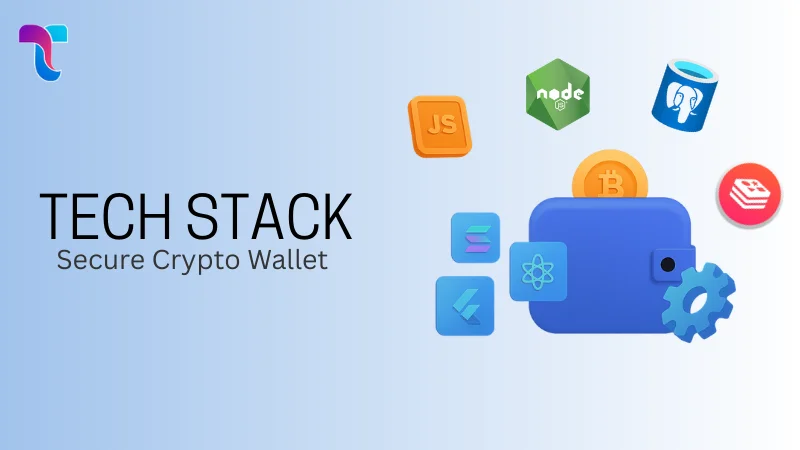Table of Contents
These days, it feels like everyone is building a crypto wallet. And the buzz isn’t without reason. In 2025, the number of active crypto wallets globally has reached 820 million, which shows just how massive and mainstream this space has become.
But with growth comes risk. In the first half of 2025 alone, over $1.93 billion was lost due to hacks targeting crypto wallets and DeFi platforms. When that much money is at stake, building on a secure and reliable tech stack is non-negotiable.
If you are building a crypto wallet, or even just thinking about it, you have probably hit that one big, confusing question: “What tech stack should I use?”
Sure, blockchain is at the core. But then there’s backend, frontend frameworks, encryption, analytics, real-time data, and security layers. Choosing the right tools can feel complicated.
That’s where we step in!
In this blog, we’ll talk about the best tech stack for building a secure and scalable crypto wallet app.
But first, let’s start with some basics!
Understanding Crypto Wallets
A crypto wallet is a digital tool that allows you to store, send, and receive cryptocurrencies like Bitcoin, Ethereum, and many others. But unlike a physical wallet, where you keep cash, a crypto wallet doesn’t actually store your coins. Instead, it securely holds the private keys, which are the cryptographic passwords that prove you own your digital assets on the blockchain. Without these keys, you can’t access or transfer your crypto.
When it comes to crypto wallets, we usually come across hot vs cold wallets.
- Hot wallets are connected to the internet, which makes them perfect for quick, everyday transactions.
- In contrast, cold crypto wallets operate offline, which keeps your private keys completely disconnected from the internet.
Core Tools & Technologies in Secure Crypto Wallet Development
Alright, now that we have covered the basics, let’s talk about the best tech stack for a crypto wallet that can help you convert an idea into reality!
Backend Tech Stack
Programming Languages: Choosing the right programming language for your backend is important.
- Node.js – It is popular for blockchain applications because it is event-driven and highly scalable. This makes it great for handling several wallet transactions.
- Go – It is preferred for performance-intensive wallet servers due to its efficiency and speed.
- Rust – It is gaining popularity in the crypto space for its memory safety features and is widely used in projects like Solana wallets.
Blockchain SDKs & Libraries: To interact with different blockchain protocols, you will need specialized SDKs and libraries, which include:
- Web3.js & Ethers.js – For Ethereum and other EVM-compatible chains, Web3.js and Ether.js are standard tools that simplify communication with the blockchain.
- BitcoinJS – For Bitcoin, BitcoinJS is a reliable library for transaction creation and management.
- Solana Web3.js & Polkadot.js – If you are working with other chains such as Solana or Polkadot, their respective libraries provide the necessary interfaces.
Database: Managing user information and transaction metadata requires a robust database. You would require:
- PostgreSQL & MySQL – These are good choices for relational data storage. It offers reliability and ease of querying.
- Redis – To improve performance, especially for wallet balances and active sessions, using Redis as a caching layer is highly effective.
Frontend Tech Stack
Frameworks: The frontend is where your users interact with the crypto wallet. Thus, it needs to be fast, responsive, and intuitive.
- React.js – It is a widely adopted JavaScript library that makes UI development efficient and scalable.
- Vue.js – It is perfect for building smooth and real-time wallet interfaces, and it is especially useful for handling transaction data updates.
- Next.js – With the help of the advanced features of Next.js, the overall performance of the wallet is improved.
Mobile Development: Since many users prefer a secure mobile crypto wallet app, choosing the right development strategy is important.
- Swift & Kotlin – Building native apps with Swift (for iOS) and Kotlin (for Android) delivers optimal performance and user experience.
- React Native & Flutter – Cross-platform frameworks like React Native and Flutter allow for faster development across both platforms with a single codebase.
Security Infrastructure
While developing, one of the non-negotiable factors is crypto wallet security features. Some of the important ones include:
- End-to-End Encryption: Implementing end-to-end encryption ensures data is protected both in transit and at rest.
- Hardware Security Modules (HSMs): Integrating Hardware Security Modules provides an extra layer of secure key management, which protects private keys from potential breaches.
- Multi-Party Computation: Using advanced key storage mechanisms like MPC technology or multi-signature setups further boosts security.
Essential APIs & Integrations
- Infura & Alchemy – To communicate effectively with blockchain networks, you will need reliable node providers such as Infura and Alchemy.
- Sumsub & Onfido – Regulatory compliance plays an important role; thus, integrating KYC/AML APIs such as Sumsub or Onfido helps verify user identities securely.
- MoonPay, Onramper, or Ramp – For smooth crypto-to-fiat transactions, partnering with fiat payment gateways such as MoonPay, Onramper, or Ramp is important.
- Firebase or OneSignal – Finally, real-time user engagement through push notifications and alerts can be achieved using platforms like Firebase or OneSignal.
Deployment & DevOps Stack
Deploying and maintaining your crypto wallet requires a scalable and resilient infrastructure. This includes:
- AWS & Microsoft Azure – Leading cloud hosting providers, such as AWS or Microsoft Azure, offer reliable services.
- Grafana & ELK Stack – To monitor your system’s health and performance, tools like Grafana and ELK Stack provide valuable insights.
Tech Stacks of Popular Cryptocurrency Wallets
To better understand how top crypto wallets are built, let’s look at the tech stacks behind some of the most popular names in the space:
MetaMask
MetaMask is one of the most widely used Ethereum-based wallets. It is built using JavaScript and React on the frontend. It even integrates Ethereum blockchain functionality through top blockchain libraries like Web3.js and Ethers.js, which enables smooth interaction with dApps and smart contracts within the browser.
Phantom
Designed specifically for the Solana ecosystem, Phantom leverages the power of Rust for backend development and uses Solana Web3.js to communicate with the blockchain. Its frontend is developed with React, which provides a sleek and responsive user experience tailored for Solana users.
Trust Wallet
Trust Wallet takes a native mobile-first approach, using Swift for iOS and Kotlin for Android. It supports a wide range of blockchains by integrating multiple blockchain SDKs, which makes it a versatile and all-in-one crypto wallet for users with diverse portfolios.
Coinbase Wallet
Coinbase Wallet is a self-custodial mobile wallet that was developed using React Native, which allows cross-platform support for both Android and iOS. It connects with multiple blockchains via WalletLink and integrates Ethereum libraries such as Ethers.js. It even offers support for NFTs, dApps, and a wide range of crypto assets.
Ledger Live
Ledger Live, the software companion to Ledger’s hardware wallets, is built using Electron for cross-platform desktop apps. The app also uses TypeScript, React, and Redux on the frontend, while communicating securely with the Ledger device to manage transactions across multiple blockchains through custom SDKs and APIs.
Wrapping Up
That’s a wrap for this blog!
Building a secure crypto wallet is no longer just about handling digital transactions. It is also about creating a safe, scalable, and user-friendly experience for users.
From choosing the right backend and frontend technologies to integrating a robust security infrastructure, every decision in your tech stack plays a critical role in the wallet’s success. And we hope our blog has helped you choose the tech stack for your crypto wallet app.
On the other hand, if you are looking for a reliable partner to help you build a secure and feature-rich crypto wallet, Technoloader is your go-to partner!
Get in touch with us and see how we can help you!
 +91 7014607737
+91 7014607737
 info@technoloader.com
info@technoloader.com








